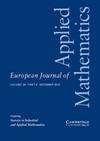导电传输特征函数的局部几何特性及其应用
IF 1.1
4区 数学
Q1 MATHEMATICS, APPLIED
引用次数: 0
摘要
本文有两个目的。首先,我们证明与导电边界条件相关的部分数据传输特征函数在 $\mathbb{R}^n$ 中的多面体或圆锥角周围局部消失,$n=2,3$。其次,我们将光谱特性应用于几何反向散射问题,即通过一次远场测量确定导电散射体的形状及其边界阻抗参数,而与介质含量无关。我们建立了几个新的独特恢复结果。这些结果在两个方向上扩展了 [26] 中的相关结果:首先,我们考虑了一种更普遍的几何设置,即同时研究多面体角和圆锥角,而在 [26] 中只涉及多面体角;其次,我们大大放宽了 [26] 中的正则性假设,这对上述几何反问题特别有用。我们开发了新颖的技术策略来实现这些新结果。本文章由计算机程序翻译,如有差异,请以英文原文为准。
Local geometric properties of conductive transmission eigenfunctions and applications
The purpose of the paper is twofold. First, we show that partial-data transmission eigenfunctions associated with a conductive boundary condition vanish locally around a polyhedral or conic corner in $\mathbb{R}^n$ , $n=2,3$ . Second, we apply the spectral property to the geometrical inverse scattering problem of determining the shape as well as its boundary impedance parameter of a conductive scatterer, independent of its medium content, by a single far-field measurement. We establish several new unique recovery results. The results extend the relevant ones in [26] in two directions: first, we consider a more general geometric setup where both polyhedral and conic corners are investigated, whereas in [26] only polyhedral corners are concerned; second, we significantly relax the regularity assumptions in [26] which is particularly useful for the geometrical inverse problem mentioned above. We develop novel technical strategies to achieve these new results.
求助全文
通过发布文献求助,成功后即可免费获取论文全文。
去求助
来源期刊
CiteScore
4.70
自引率
0.00%
发文量
31
审稿时长
>12 weeks
期刊介绍:
Since 2008 EJAM surveys have been expanded to cover Applied and Industrial Mathematics. Coverage of the journal has been strengthened in probabilistic applications, while still focusing on those areas of applied mathematics inspired by real-world applications, and at the same time fostering the development of theoretical methods with a broad range of applicability. Survey papers contain reviews of emerging areas of mathematics, either in core areas or with relevance to users in industry and other disciplines. Research papers may be in any area of applied mathematics, with special emphasis on new mathematical ideas, relevant to modelling and analysis in modern science and technology, and the development of interesting mathematical methods of wide applicability.

 求助内容:
求助内容: 应助结果提醒方式:
应助结果提醒方式:


